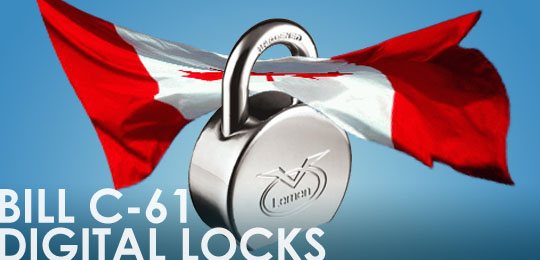Bill C-32 and digital locks
 When the Canadian government put forth it’s new copyright bill last week there were few surprises. The new bill still supports making circumvention of digital locks illegal, thereby negating many of the fair dealing provisions allowed for in the Conservative’s ‘new and improved’ version of bill C-61. Support for freeing up the DRM section of bill C-32 has been growing since it’s announcement. Besides the large swath of consumers opposed to DRM’ed content, groups such as The Canadian Booksellers Association and the Retail Council of Canada are saying “some parts of the legislation unfairly restrict consumer freedom and choice and need to be revised before being passed by Parliament.”
When the Canadian government put forth it’s new copyright bill last week there were few surprises. The new bill still supports making circumvention of digital locks illegal, thereby negating many of the fair dealing provisions allowed for in the Conservative’s ‘new and improved’ version of bill C-61. Support for freeing up the DRM section of bill C-32 has been growing since it’s announcement. Besides the large swath of consumers opposed to DRM’ed content, groups such as The Canadian Booksellers Association and the Retail Council of Canada are saying “some parts of the legislation unfairly restrict consumer freedom and choice and need to be revised before being passed by Parliament.”
The problem with ‘digital locks’ is that even if you as a consumer have a right to copy a commercial DVD or Blu-Ray disc for personal use, which is covered under the bill, if that disc has a digital lock on it, the act of picking that lock to do something legal is in itself, illegal. A fair analogy would if you lose the keys to your house, and pick the lock on your front door to get in, you’d still be breaking and entering.
Michael Geist, once again, has been at the forefront of making the bill both decipherable, and providing excellent commentary on the subject. He’s taking a look at the bill through a series of articles posts titled “Setting the Record Straight: 32 Questions and Answers on C-32’s Digital Lock Provisions”. In the first part, he starts off with looking at the digital lock provisions. One of the interesting issues raised in the article is the very constitutionality of having digital lock laws that don’t directly related to copyright. You can read Part One here.




861930 428101really excellent put up, i surely adore this internet site, maintain on it 168981